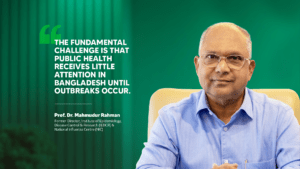1. Let’s start with your early life—what were some of the key experiences that shaped you, and what inspired you to pursue this career journey across various industries?
I grew up in a semi-joint family in Old Dhaka, where life revolved around a big courtyard at my grandfather’s house—a rare luxury in that part of the city. It was our personal sports complex: football, cricket, badminton—every game had its season. I was more of a field champion than a classroom one, often sneaking out of school to catch a match or a Bangla movie at the local theatre. Unsurprisingly, I barely scraped through my SSC exams with a second division in commerce.
That year, the children of my parents office helped, both from extremely modest backgrounds, secured star marks, as did almost all my cousins. That evening, my parents didn’t say a word. But their silence was louder than any disappointment. It wasn’t anger-it was quiet heartbreak. They had never expected much, but even that I had failed to meet. That was my first wake-up call, the turning point that shaped the rest of my journey.
From that day, I decided I wouldn’t give them another reason to feel that way. I gradually shifted my focus from the field to the classroom. My cinema choices also matured, from Bangla blockbusters to English classics. And perhaps most importantly, growing up in a joint family taught me early on the values of teamwork, empathy, and harmony- traits that became central to my leadership style later in life.
This ability to work across perspectives and adapt to changing roles helped me seamlessly move across industries—from finance and telecommunications to consultancy and public sector governance. At various events, I often shared this story with young professionals to remind them that a humble beginning doesn’t define the ceiling—it defines the starting line. It’s how you respond that sets the course.



2. Reflecting on your diverse career, what would you consider to be some of the most defining milestones, whether it was a leadership decision or a major transformation you led, that have had a lasting impact on your professional journey and personal growth?
While the SSC turning point redirected my academic focus, my professional transformation began from an entirely different intention. I never imagined myself as a lifelong corporate executive. My father wanted me to join his textile venture, and I, too, initially envisioned a life in entrepreneurship. But life had its own plans.
I joined IDLC simply to build a grounding in finance. Then came Unilever Bangladesh—an institution that didn’t just teach me marketing and manufacturing, but embedded in me a deep understanding of systems, discipline, and consumer insight. Regular promotions pulled me further into the corporate world. Soon, I was expatriated to Pakistan as the Commercial Manager for Unilever’s Ice Cream division, and later worked in Unilever Arabia. These international roles—part of Unilever’s leadership grooming framework—taught me adaptability, cultural intelligence, and strategic agility.
I still recall the Lux debacle (Halal soap)—a counter action that led to regain of lost pride. I was also instruemental to shape the detergent outsourcing model, a move that significantly changed supply chain dynamics.
But it was at Robi Axiata Ltd. that the most defining milestones emerged. Leading the merger between Robi and Bharti Airtel was not only one of the largest telecom mergers in Bangladesh, but a real test of strategic negotiation, stakeholder management, and cultural integration. We led the launch of 4G, listed Robi on the stock exchange through a landmark IPO, and even tied national pride with business by sponsoring the Bangladesh National Cricket Team.
Perhaps most satisfying was turning around Robi from a heavy loss-making entity to profitability—without cutting corners. We introduced bold, textbook-worthy strategies like the Kill Banglalink (BL) Strategy, Non-CCD Strategy (targeting dominance in Northern and Southern regions), Dual Brand Positioning, and a 4G-first approach. Each of these required a mix of data, intuition, and courage—and every one of them delivered results.
These milestones weren’t just achievements—they were transformation points that reshaped me as a leader. From learning resilience in Pakistan to driving national-scale reforms in Bangladesh, every experience built upon the other. What started as a reluctant entry into service evolved into a lifelong passion for building teams, turning around organisations, and leading with purpose.

3. As the current President of the Institute of Cost and Management Accountants of Bangladesh (ICMAB), how do you envision the institute enhancing opportunities for accountants in Bangladesh, especially in light of the evolving global financial landscape?
We’re steering ICMAB toward becoming a catalyst for national development. My vision involves three pillars: employability, digital transformation, and global integration. We’re working to ensure our members are industry-ready through strategic partnerships, upgraded learning platforms, and policy advocacy. At a time when technology and ESG principles are redefining finance, we’re equipping CMAs with the skills to lead—not follow—these changes. And we’re opening global doors for our professionals by building recognition and alliances with international bodies.

4. Given your involvement with both state-owned enterprises and private corporations, what is your perspective on the current state of public-private partnerships in Bangladesh? How can these collaborations be optimized to drive national economic growth?
Bangladesh is at a crossroads where public-private partnerships (PPPs) can play a game-changing role—but only if we shift from transactional engagement to transformational collaboration. While some PPPs have shown promise, many remain underutilised due to bureaucratic inertia and lack of risk-sharing frameworks. The solution lies in reforming procurement policies, ensuring transparency, and encouraging innovation-driven models where both sectors co-create value. With the right enabling policies, especially in sectors like infrastructure, shipbuilding, education, and ICT, PPPs can become the backbone of our growth story.



5. With your extensive experience in both the telecommunications sector and key strategic industries, how do you assess the current state of Bangladesh’s economic scenario? In your view, what are the major challenges and opportunities, particularly within the telecom industry, in driving industrial growth, attracting investment and fostering long-term economic resilience?
Bangladesh’s economic foundation is solid, but the architecture needs reinforcement. The telecom sector—once a jewel in our development crown—is now constrained by over-regulation, inconsistent policies, and underinvestment in infrastructure. Yet, it remains our greatest enabler for industrial growth, digital inclusion, and financial access. If we can ensure policy predictability, spectrum reforms, and incentivise innovation, the sector will not only attract more FDI but also catalyse other industries like fintech, education tech, and e-commerce. Our economic resilience will depend on how agilely we adapt to technology and how transparently we govern its enablers.

6. There was a time when joining the telecom industry was considered a big achievement, especially among fresh graduates, and the sector was highly attractive in the job market. Why do you think the telecom industry had such strong appeal back then, and do you think that interest still exists today?
In the early 2000s, the telecom industry in Bangladesh was nothing short of our own Silicon Valley. It was a sunrise sector – dynamic, fast-growing, and full of promise. With double-digit subscriber growth, minimal regulation, and intense competition driving innovation, it quickly became the most coveted destination for fresh graduates. It offered not just attractive pay packages but a platform for merit-based growth, global exposure, and the chance to work with cutting-edge technology. For many of us, it was the place to build not just a career, but a legacy.
However, as the sector matured, the landscape shifted. Regulatory interventions increased-often with good intent but poor execution. Over time, the influx of politically linked beneficiaries into the broader ecosystem disrupted the competitive balance. Instead of fostering innovation, the industry became entangled in compliance complexities, policy inconsistencies, and rent-seeking behaviour. For investors, the sector began to lose its shine; for young professionals, it began to lose its charm.
Today, the growth curve has flattened, and most players are in consolidation mode—optimising operations, cutting costs, and focusing on survival rather than expansion. That said, the telecom industry still remains one of the better paymasters in the job market. And despite its current challenges, it retains the potential to reinvent itself—if bold reforms are pursued.
With the right regulatory reset, a push towards 5G, AI, MFS and digital service innovation, and by creating space for intrapreneurship and creativity, the telecom sector can reignite its appeal. The hunger among young talent for purpose, technology, and scale is still there—it’s the industry that now needs to catch up.

7. Bangladesh’s shipbuilding industry has grown significantly, with exports reaching approximately $1 billion in recent years. As a board member of multiple shipyards, how do you see the sector evolving, and what steps can be taken to enhance its global competitiveness?
The shipbuilding sector is Bangladesh’s sleeping giant. With the right investments in technology, skilled manpower, and eco-friendly innovation, we can transition from low-value vessels to high-end maritime solutions. We need policy incentives for green shipping, better access to export finance, and strategic alliances with global players. As a board member of Navy and Army-backed shipyards, I see the sector as a strategic asset that can drive not just exports, but national resilience and maritime dominance.

8. Holding leadership positions in both corporate and public sectors, what is your vision for Bangladesh’s business and industrial growth over the next decade? Which sectors do you believe hold the most promise, and what steps should be taken to realize this potential?
My vision is simple: inclusive industrialisation powered by innovation. Sectors like renewable energy, ICT, logistics, agro-processing, and healthcare will be growth engines if we fix ease-of-doing-business, tax policies, and skills development. The public sector must act as an enabler, not a competitor. We need to unlock the power of SMEs, foster start-up ecosystems, and digitalise government services to reduce friction. If we focus on execution and governance, Bangladesh can be a $1 trillion economy sooner than we imagine. Let’s shift our mindset from Job Seeker to Job Creator!

9. According to you, what essential skills and qualities do you believe young professionals need to develop to thrive in today’s competitive corporate world? Additionally, what advice would you offer to aspiring leaders looking to make a lasting impact in their industries?Curiosity, adaptability, and ethical courage—these are non-negotiables. The ability to unlearn and relearn is more important than any degree. Young professionals must blend technical expertise with emotional intelligence because leadership today is about empathy as much as efficiency. My advice: Don’t chase titles, chase impact. Be brutally honest with yourself, and relentlessly kind to others. Leadership is not a destination but a daily practice of showing up with integrity, purpose, and humility.






